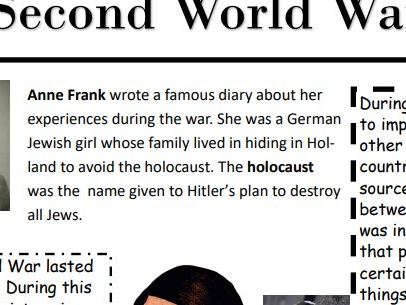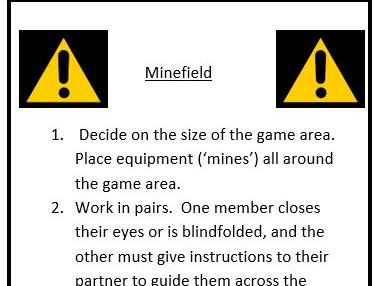75Uploads
17k+Views
1k+Downloads
All resources

Dicey spellings: activity sheet to learn spellings.
For use by all pupils including SEN. Choose a word to learn (depending on the child you can use the common exception words list for Year Two or the 3/4 or 5/6 spelling lists). Roll the dice to determine what to do with the target word. The multi-sensory approach is particularly good for dyslexic students. Designed to be used as an independent activity.
Bundle

DT skills knowledge organisers
Two knowledge organisers. One focusing on food preparation skills and one focusing on different stitch types. Contains pictures, diagrams and text.

Gustav Klimt Knowledge Organiser
A knowledge organiser about the Austrian artist Gustav Klimt. Aimed at KS1 or LKS2, it contains facts about his style and examples of his work.

Vocabulary Games and Activities
Four different games to improve vocabulary. Instructions and categories for Scategories, instructions for Call My Bluff, and instructions and a full set of question cards for grammar vocabulary Jeopardy and maths vocabulary Jeopardy. The games can be played as a whole class but the instructions are written to be understood and played independently by small groups of UKS2 children or lower if certain vocabulary is removed from the Jeopardy games.

Albert Einstein Assembly
A short assembly powerpoint, suitable for Primary schools, about the scientist Albert Einstein. Contains information about his life as a scientist and refugee. The presentation includes photos and presenter notes.

Verb tenses and parts of a sentence knowledge organiser
A two-page knowledge organiser. The first page covers the main tenses covered in KS2. The second page explains different parts of a sentence: main clause, relative clause, prepositional phrase, noun phrase and fronted adverbials.

Guided reading questions How the Whale Became by Ted Hughes
Guided / group reading questions about three of the stories in How the Whale Became and Other Stories: How the Whale Became, How the Elephant Became and How the Bee Became. Each sheet of questions contains vocabulary questions, fact retrieval questions and inference questions. Answers included. These are questions about the text, not the text itself.

Kingdom of Benin Knowledge Organiser
A knowledge organiser about the kingdom of Benin. It contains facts and images about the kingdom.

DT cooking pizzas knowledge organiser
A two-paged knowledge organiser for DT cooking. It has a recipe for pizza dough on one page and pizza sauce on the other. It contains photos to show how to prepare food safely.

Metric and imperial measurements knowledge organiser
A two-paged knowledge organiser about measurements. It covers metric and imperial measurements of weight, length and liquids.

Edvard Munch Knowledge Organiser
A knowledge organiser about the Norwegian artist Edvard Munch. It contains facts about his life and examples of his work.
Bundle

History knowledge organisers
A set of five history knowledge organisers. They cover; Ancient Greeks, Crime and Punishment, Ancient Maya, Second World War and Vikings and Anglo Saxons.

Victorian knowledge organiser
A two-page knowledge organiser about the Victorian era. Page one contains facts and pictures about Victoria herself, whereas page two contains pictures and facts about societal changes of the time. Aimed at upper Key Stage two.

DT carrot soup knowledge organiser
A two-page knowledge organiser with a recipe for carrot soup. Aimed at upper KS2 it contains a full recipe plus illustrations and descriptions of how to prepare ingredients safely.

Greater Depth Writing Knowledge Organiser
This is a two-paged knowledge organiser to help children reach the Greater Depth writing standard. Page one explains and gives examples of the expected punctuation. It also provides examples of formal writing and how to manage shifts in formality. Page two, contains all of the spellings from the 5/6 spelling list. Aimed at Y6.

trompe l'oeil knowledge organiser
A one-page knowledge organiser about the style of art known as trompe l’oeil. The page includes examples of this work and facts. Aimed at upper KS2.

Word Wall - SEN resource for teaching key words
Can be laminated or photocopied. Choose the key words you want the child to learn. Write randomly across the bricks. Make sure you include at least one that the child is already confident with. If the child is confident, they can read the words independently from the start, or with less confident children, the adult can read first, then child and adult together, before the child reads independently. Use frequently to practise SEN targets.

Sound Stars: SEN phonics practise sheet
A sheet to be laminated or photocopied. Use to practise target letters or graphemes. Choose three or four letters/graphemes, at least one of which the child is already confident with. Write the sounds in random order in each of the stars. Depending on the confidence of the child, they can either read independently from the start and improve their scores, or the adult can read it first, then adult and child read together before finally the child reads independently. Useful for working towards personal IEP targets.

Team building games
Six team building games. Good for PSHE lessons, instruction writing and the beginning and end of term. Includes ideas for extension. They are designed to be read by children as well as adults.




















